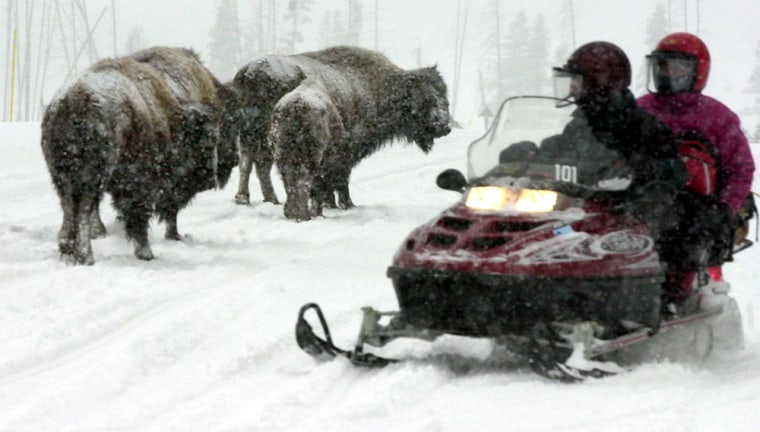An association of retired National Park Service employees on Friday accused Bush administration political appointees of hijacking America’s national parks, saying a leaked Interior Department document shows a move to stress recreation and resource development over park preservation.
“Britney Spears could hold a major concert at Shiloh National Military Park or nearly any national park since the new rules significantly increase the emphasis on permitting public uses over the traditional mission of preserving historic and natural places,” the Coalition of National Park Service Retirees said in a statement.
The group singled out Paul Hoffman, who oversees the Park Service as an assistant Interior secretary, as being behind the revisions. Formerly head of the chamber of commerce in Cody, Wyo., outside Yellowstone, Hoffman had also worked for Dick Cheney when the vice president was a U.S. lawmaker in the 1980s.
Park Service response
In a Los Angeles Time report published Friday, the National Park Service defended Hoffman's role.
“Paul Hoffman had some initial suggestions and prompted us,” said NPS spokesman David Barna. “Paul Hoffman was playing devil's advocate. He was saying, 'Show us, the political appointees who make policy, why do you do things the way you do?' It was a starting point. We're a long way from that now. They have drafted a new raw draft.”
But the retirees' group, in a press conference later Friday, said the process hasn't been an open one. “The hundreds of proposed changes to NPS procedures have been drawn up with no input by Congress, the public or the superintendents of national parks,” the group said.
Bill Wade, chairman of the group and a former superintendent at Shenandoah National Park, said in a statement that the group “opposes this astonishing attempt to hijack the management of the 388 areas of our nation’s park system and convert them into vastly diminished areas where almost anything goes.
“Until recently, both political parties have viewed the management of our parks as ‘off limits area’ where partisan politics are set aside and decisions are made based on what is truly in the public’s interest. These draft policies shatter that precedent.”
Wade also told reporters the revisions would give “disproportionate influence” to communities just outside the parks in deciding public use.
A community focused on its economic interest, he added, is not necessarily focused on the long-term health of a national park.
The coalition cited these examples of what the rules would bring:
- The use of snowmobiles would be radically expanded at Yellowstone and other national parks, allowing them to travel over any paved road in winter.
- Grazing and mining would be elevated to "park purposes," thus ensuring their continuation.
- The use of jet skis, ORVs, dirt bikes and other mechanized vehicles would be permitted on a virtually unrestricted basis.
- Tourist flights would increase, impacting the natural peace and quiet at parks.
- Rangers would be forced to kill bears at parks like Yellowstone if they damaged private property.
Superintendent's concern
The Los Angeles Times also quoted some current Park Service managers as being opposed to the revisions.
“They are changing the whole nature of who we are and what we have been,” J.T. Reynolds, superintendent of Death Valley National Park, was quoted as saying. “I hope the public understands that this is a threat to their heritage. It threatens the past, the present and the future. It's painful to see this.”
Larry Whalon, resource manager at Mojave National Preserve, said managers would lose the ability to use the Clean Water Act, the Clean Air Act and other laws to oppose new developments in parks.
The Times reported that the Interior Department last month sent a copy of the revisions to Park Service headquarters, which forwarded it to its seven regional directors, who responded by sending a searing memo criticizing the revisions.
The Park Service then convened 16 longtime employees in early August to try to settle on a compromise version of Hoffman's proposal.
“I was profoundly shocked at how far it went,” a participant in the workshop was quoted in the Times as saying. He said the group continued to work on the rewrite but was not sure if its watered-down version would be acceptable to Interior officials.
The retirees' group posted the initial Interior revisions online at www.npsretirees.org/
